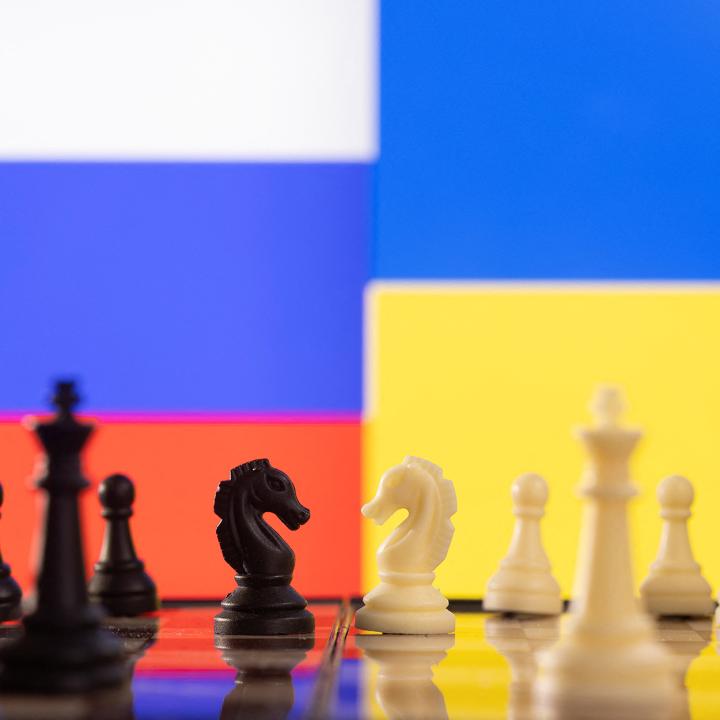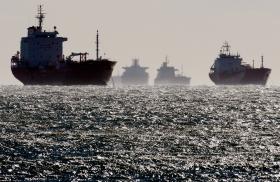
- Policy Analysis
- PolicyWatch 3591
How Will the Ukraine Crisis Affect Middle East Policy?

Three experts discuss whether the war might alter Washington’s calculus on rapprochement with Turkey, regional military deployments, and wider great power competition.
On March 3, The Washington Institute held a virtual Policy Forum with Anna Borshchevskaya, Soner Cagaptay, and Grant Rumley. Borshchevskaya is a senior fellow in the Institute’s Diane and Guilford Glazer Foundation Program on Great Power Competition and the Middle East. Cagaptay is the Institute’s Beyer Family fellow and director of its Turkish Research Program. Rumley is a senior fellow in the Glazer Foundation Program and former Middle East policy advisor at the Pentagon. The following is a rapporteur’s summary of their remarks.
Anna Borshchevskaya
For Vladimir Putin, the invasion is about playing out the Cold War with an alternate ending. And despite the sense of euphoria regarding Ukraine’s strong pushback, the Russian attack will persist, and Kyiv may turn into another Aleppo.
Thus far, Middle Eastern responses to the war indicate that Putin has built good relations and pragmatic leverage across the region. The Iranian and Syrian regimes and their proxies are backing his invasion, while other governments are hesitating to take sides. For instance, Turkish president Recep Tayyip Erdogan cannot afford to alienate him, and Israel is walking a fine line. Yet no matter how flexible Putin has sought to be, his closest partnerships remain with anti-American actors.
Regarding the war’s potential effects on the Middle East itself, one key factor is Ukraine’s connection to the Black Sea and Sea of Azov. Moscow views these two seas and the East Mediterranean as a three-tiered defensive perimeter protecting Russia’s southern underbelly, so the outcome may influence Putin’s future posture toward the various states along and near these waters. The crisis might also endanger food security, particularly for Lebanon, Egypt, and Israel. This could in turn trigger massive refugee flows across the region. Putin has weaponized such flows in the past and will not hesitate to do so again. Moreover, given Russia’s commercial ties to the Middle East, the flood of international sanctions against Moscow will hit the region financially. Energy prices have already been affected.
Although Putin avoided a quagmire in Syria, he may not be able to avoid one in Ukraine. He will use his strategic leverage in the Middle East to continue the fight, but just as his military success in Syria gained him respect across the region, eventual failure in Ukraine could threaten his position. The international community should not wait for that to happen, however. Putin used a whole-of-government approach to coerce the West, so the West should do the same to challenge him.
In doing so, Washington should not underestimate Russia’s ability and desire to test U.S. forces. Depending on how the Ukraine conflict unfolds, Russian forces may undertake such tests in Syria, as they have done in the past.
More broadly, leaders in the Middle East and North Africa view the United States with a great deal of uncertainty at the moment, and many are diversifying their foreign policies because they do not believe they can count on Washington. For instance, this perception affected the United Arab Emirates during initial UN deliberations on how to respond to the invasion. Officials should therefore look more closely at U.S. leverage, assessing what has worked and what can be done differently. Although Washington did not prevent the invasion, it did take the effective step of releasing information about Russia’s plans to create a false flag operation. This left Putin without even an artificial excuse for invading, undermining his credibility and narrative.
Regarding the Iran nuclear deal, Russian officials have often come to Tehran’s defense during the negotiations. Despite signaling their preference for a non-nuclear Iran, they can afford to wait on this issue. Therefore, Western officials should be skeptical of any Russian claim that cooperation in Ukraine is tied to cooperation on the Iran deal.
Soner Cagaptay
Turkey’s policy toward the war can be described as “pro-Ukraine neutrality.” Going forward, the crisis offers a strategic opportunity for Ankara to improve its ties with Washington.
Erdogan has shared a bond with Putin since the latter’s outreach to him following a 2016 coup attempt, but the two countries are not allies. In particular, they remain rivals on the Black Sea, where the 1936 Montreux Convention regulating maritime access has recently come under focus. According to its terms, only littoral states can maintain large, permanent navies on the Black Sea, and Turkey is the designated gatekeeper for deciding whose vessels can sail through the western straits during wartime. There is some ambiguity about these legalities, however, and Russia remains the superior military power.
Consequently, Ankara views Ukraine as a key ally in counterbalancing Moscow and will do a great deal to prevent Kyiv from falling under Putin’s thumb. At the same time, Erdogan cannot afford to alienate Russia too much because the Kremlin can do a great deal to threaten his reelection prospects in 2023. For instance, if the war drags on and Turkish assistance tilts the balance of power in Kyiv’s favor, Putin could take military action in Syria that triggers refugee flows toward Turkey, and/or implement trade and tourism sanctions that undermine its economic rebound. He might even initiate direct clashes with Turkish forces or proxies in Syria.
In practical terms, this means Ankara will support Ukraine diplomatically and materially, but without joining economic sanctions against Russia. It will also implement Montreux in a “neutral” but mostly helpful manner, especially if the war is prolonged.
Because the war has added a dose of realism to Turkey’s views on Russia, the time is ripe for Washington to engage Ankara in deeper strategic conversations—ideally in private. These deliberations should focus on reaching a grand bargain that includes the following elements: increasing bilateral cooperation on Ukraine; nixing Turkey’s S-400 missile deal with Moscow; revisiting U.S. policy toward Kurdish forces in Syria; re-inviting Turkey into the F-35 project; seeking congressional approval for F-16 sales to Ankara; and providing ironclad agreements that Russia will not be permitted to harass Turkish troops and proxies in Syria.
Grant Rumley
In the near term, U.S. military posture in the Middle East is unlikely to be directly affected by the Ukraine crisis. Most of the forces that were repositioned to support NATO allies were already based in Europe, with the exception of 82nd Airborne elements. Yet a prolonged conflict could constrain some of America’s important long-term military efforts in the region.
One example is U.S. missions focused on reassuring partners. Long-term fighting in Europe might pull some of these high-demand assets away from areas like the Persian Gulf to better support NATO allies.
More broadly, the war is a clarifying moment for the United States and its partners. Israel is very concerned about destabilizing its relationship with Russia over Syria. Jordan is concerned about the security of its borders, particularly in terms of drug smuggling. The UAE and Saudi Arabia are mindful of their longstanding, close relationships with Russia, particularly in the oil sector as fellow members of the OPEC+ cartel. Meanwhile, many partners perceive the United States to be a withdrawing power and see Russia and China as hedges against that. Washington should therefore tout the wave of international support it has spearheaded for Ukraine, contrasting the West’s rapid mobilization of military assistance and economic sanctions with the actions (or inaction) of other great power competitors in the region and beyond.
Regarding the sanctions themselves, the various measures targeting Russia’s economy and defense industry will have secondary effects on Moscow’s arms sales to the Middle East. Despite the extant risk of triggering the Countering America’s Adversaries Through Sanctions Act (CAATSA) U.S. partners have sometimes turned to the Kremlin for equipment that was either cheaper or offered with fewer perceived strings attached. Now that sanctions on Russia have mushroomed, they will have to weigh additional risks when contemplating such purchases. This turn of events gives U.S. officials an opportunity to step in and bring these regional partners back into the fold—though it could also steer them toward China or other providers instead.
This summary was prepared by Carol Silber. The Policy Forum series is made possible through the generosity of the Florence and Robert Kaufman Family.





